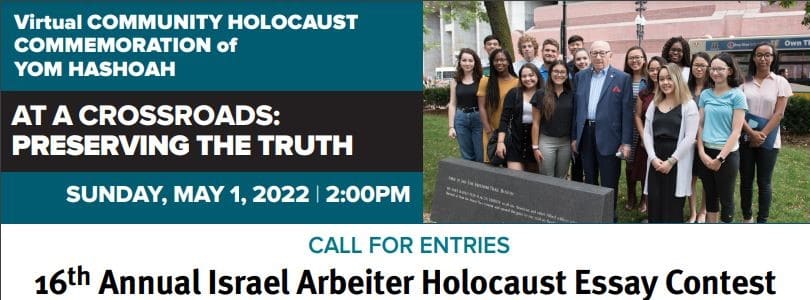On Thursday we commemorated International Holocaust Remembrance Day, the global day set by the United Nations marking the anniversary of the liberation of the Auschwitz-Birkenau death camp on January 27, 1945.
I had the privilege a few years ago to visit Auschwitz. As anyone who has been there would tell you, the scale of the place is overwhelming. Despite everything I know and have learned about the Holocaust, I was completely unprepared for the size of this place. The sorting ramp – a railroad platform – where arriving Jews were separated and condemned to death or forced labor (or, horrifically, violent human experimentation) seems endless. As one walks from there on the path to the death machine, one only begins to absorb the scale of this space where 100,000 people were being kept at any given moment in slave conditions as they awaited the gas chambers.
100,000.
That’s a scale equivalent to the population of the city of Cambridge, where I live.
I’ve been thinking about that experience a lot this week, as several disheartening events unfolded directly related to Holocaust memory and education:
- Last weekend Robert F. Kennedy Jr. said the opponents of COVID vaccinations in the U.S. had it worse than Anne Frank: “Even in Hitler Germany (sic), you could, you could cross the Alps into Switzerland. You could hide in an attic, like Anne Frank did.” Recall that this teenager was killed by the Nazis at the Bergen-Belsen death camp, because she was a Jew. (He has since apologized, after being publicly condemned by his own wife, but we should note that this comes as part of a history of offensive Holocaust analogies.)
- On the eve of Holocaust Remembrance Day, Tucker Carlson devoted an entire Fox News show to promoting and perpetuating the white supremacist “great replacement” conspiracy theory – which centers Jews in a conspiracy to destroy Western, i.e. Christian and white, civilization. That’s the same conspiracy theory that was referenced by those “Jews will not replace us” chants in Charlottesville in 2017. ADL rightly called it out.
- And, in Tennessee, the McMinn County school board unanimously removed from their curriculum Maus, the Pulitzer Prize winning graphic novel depicting the experience of the author’s father, a Holocaust survivor. As one board member said “It shows people hanging, it shows them killing kids.” As if the only way to teach history is to ignore or deny the bad parts.
Still, in the midst of all of this, there is cause for hope. With leadership from Germany and Israel, the United Nations overwhelmingly adopted a resolution taking a stand against Holocaust denial and distortion (Though there was one unsurprising holdout – the Iranian regime).
And locally, Boston’s Museum of Fine Arts returned a stolen painting to the family of a Hungarian survivor, in what their attorney described as “a model restitution process.”
I can’t stop thinking about the scene yesterday in the Bundestag, Germany’s parliament, where the Speaker of Israel’s Knesset, Mickey Levy, said the Kaddish – the Jewish prayer to honor our dead. It’s gut-wrenching. It’s also a reminder of the potential of a people to face a terrible wrong in partnership with their victims, honestly, and forthrightly.
And, I remind myself that, for the first time, we in Massachusetts marked this week’s anniversary with a new state law in place that we at JCRC were proud to advocate for, along with key partners, mandating Holocaust and Genocide education in our schools.
Three years ago, after visiting Auschwitz, my primary observation in that moment was: one cannot ever fully understand the scale of the Shoah, the death camps, and complete devastation, but still, we must make the effort to do so. One cannot begin to truly comprehend Auschwitz without walking in this place, but we must make the effort to do so.
Not everyone is blessed with the opportunity for that tactile experience, but we are all still able – even if only for a finite number of years– to bear witness first-hand to the memories of the survivors, and to become stewards and transmitters of those memories to future generations.
Progress is indeed possible. But it takes work. A lot of work. Especially in these times when there are those who choose to minimize, distort, or deny.
We’ll stay at it. And I hope that you will too.
Shabbat shalom,
Jeremy Burton
JCRC Executive Director



